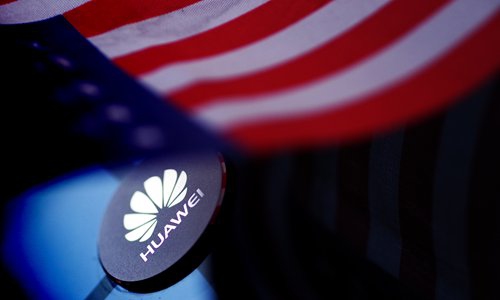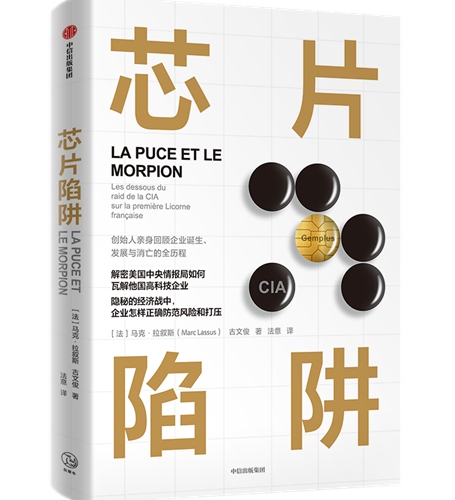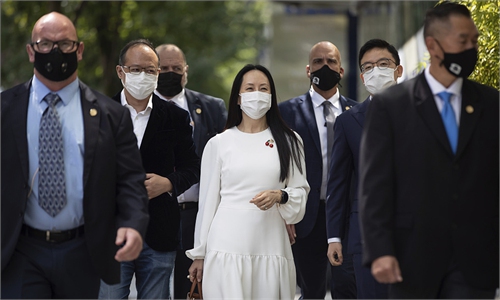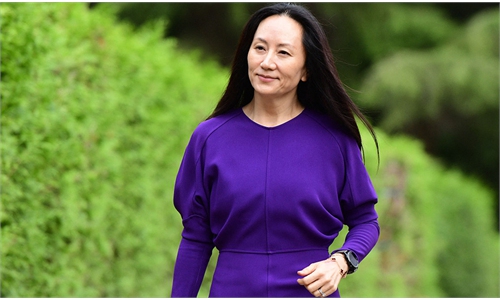Selfish, imperialistic policies remain rule of US business ties with others: author of The Chip Trap

File photo: IC
Editor's Note:
It is uncertain how many companies and entrepreneurs have fallen victim to US global hegemony, yet Marc Lassus (Lassus), founder of Gemplus, world's leading manufacturer of smart cards (including SIM cards), is one of them. After witnessing Lassus' smart card business made a great noise with the number of users reaching billions of people as soon as the cards came out, the US took control of the company, drove Lassus away for greater capabilities to spy the worlds via Gemplus' SIM cards. Recently, Lassus told his stories in the book La Puce et le Morpion: Les dessous du raid de la CIA sur la première Licorne française (The Chip Trap) and shared his encounters with Global Times (GT) reporters Bai Yunyi and Li Aixin.
GT: What made you decide to write this book? What kind of feedback has the book received in France since it was published?
Lassus: My company's (Gemplus) problems with the CIA started as early as beginning of year 2000. Many reasons explain why it was not written earlier:
First, we didn't have all the facts, early on, giving evidence of CIA's interference.
Second, it wouldn't have been credible coming from an isolated French entrepreneur with no connections nor support from his government.
Third, Edward Snowden's revelations (disclosures) about CIA/NSA role in international spying using precisely mobile telephone SIM cards came only 12 years after my company was attacked by the US through CIA/NSA.
Fourth, after the CIA/NSA aggression, my personal situation was miserable and the only choice for me was to be very discrete keeping a very low profile in order not to be exposed to dangerous retaliations.
It is only after January 2019 when Frédéric Pierucci published his book Le Piège Américain (The American Trap)I felt free, credible (and publicly protected) to disclose Gemplus' and my story. Pierucci's book relates the US aggression, through General Electric, to take control of ALSTOM, a French company. Pierucci has been put for two years in jail in the US! A real scandal.
Regarding the sales, our book, unfortunately, has been published in France in the middle of social events (strikes) and just at the beginning of the COVID-19 pandemic. We couldn't develop a real promotion and none of the big editors in France endorsed our book because they were afraid of CIA. However, since very recent spying events still organized by CIA/NSA have been disclosed, involving European heads of state as targets, our book is enjoying a real surge in its sales today! Sales are booming as promotion started.
GT: How did the US control Gemplus? Could you share one or two things that impressed you most?
Lassus: At the beginning the US came as "friendly investors," injecting through the Texas Pacific Group (TPG), a large amount of money with the promises to open and develop the US market which was late on smart cards technologies. They pretended having excellent connections with then US administration.
They also allied immediately with the No. 1 investor at Gemplus, the German Quandt Family, which was the richest family in Germany. Addition of TPG shares, plus Quandt, plus General Electric shares, gave them the full control of the company and the capability to eject me from my position of CEO.
What we didn't know is that Quandt was under the full control (and the protection) of the CIA since World War II. CIA used Gunther Quandt's strong influence, after the war, especially in East Germany and other countries, to contain and fight the role of the Russians. Nothing could be done by my faithful colleagues in the company and myself to fight such a coalition.
In order to overwhelm me totally, TPG organized law suits, threats to me and my wife, burglaries, computer and telephones theft, and so on.
At a certain time they tried to prove that I had violated the US embargo against Cuba since I had spent one week in La Habana, Cuba on a personal tourist trip. I escaped by miracle from being taken to jail in the US (like Pierucci).
GT: Your company worked closely with China. Do you think that was one of the reasons why the US tried to control Gemplus?
Lassus: It is certainly one of the reasons! Their goal was, through CIA and NSA, to spy on the whole world starting with China.
In less than two years we gained more than 400 millions SIM cards customers in China alone!
Nevertheless, today, using the SIM cards deployed on the market, is not as important as it was in the past because the US GAFAM companies (Google, Apple, Facebook, Amazon and Microsoft) are giving access to the US government to the data they gather from their customers worldwide. A very powerful way to spy the whole world!
GT: What do you think of the arrest of Huawei's CFO Meng Wanzhou? What does the US hope to achieve through it?
Lassus: To me, it is crystal clear.
Huawei has a very significant advance in 5G communications infrastructures and to some extend in fiber optics their presence in Africa is also very strong and it is too late to beat them.
Meng Wanzhou's detention in Canada is just a pure scandal as well as their request for extradition in the US.
The US will always use brutal and "cowboy" approaches. The move from the Trump administration to Biden's will not change much the US policies.
GT: For a long time, the US has been promoting the concept of "free and competitive markets." How do you feel when you hear this rhetoric of the US after going through all this drama? According to your view, is what the US did to companies like yours the exception or the norm?
Lassus: Definitely it is a norm! Look at what is happening to Huawei, ZTE, pressures on chip manufacturers such as Samsung and above all on TSMC in the island of Taiwan, the French automobile and oil Industries in Iran, and so on.
The US values of free markets are pure hypocrisy. They use any possible mean to suppress other countries' high-tech companies from being successful on international markets.
GT: The US hopes to establish a transatlantic economic and technological alliance with the EU to jointly deal with competition with China. What's your take on this? Can the US and Europe form a solid economic and technological union, and treat each other on equal footing?
Lassus: To me, it is pure wishful thinking!
The 27 countries composing the European Union will never agree to a single policy, especially when everybody knows today that the US and Israel are still spying on anyone, including heads of state, journalists, opponents.
I don't believe at all that Europe will benefit from any cooperation with the US.
In addition to business, especially with the US, the "selfish and imperialistic policies" will remain the rule!
GT: What practical suggestions do you have for China's high-tech enterprises? How can they avoid falling into a US trap?
Lassus: First, never use US dollars as a currency for any transaction.
Try to never use US internet or any GAFAM product.
To ally only with safe partners.
GT: As a professional, how do you see the development prospect of China's chip industry? How do you see the prospect of high-tech cooperation between China and Europe? Will their cooperation encounter a setback because of the US?
Lassus: I see the current US policies against China as a catalyst to speed up the Chinese semiconductor industry. It is very clear now China should put more effort and investments than ever to develop key technologies in the semiconductor industry such as key equipment, materials and design tools, and so on. Especially since the US is trying to ban any exchange between world leading companies and China.
China must develop alternatives either locally or through trusted international partners with world specialists in these areas. Options are still open but the ways to do so become more complex.
I also think it is a great time for many European high-tech specialists companies to emerge as trusted alternatives for cooperation opportunities brought by China. However, mutual understanding in different aspects still needs to be achieved. In my opinion, Chinese companies should also learn how to work and build a trusted culture with European innovative companies and ecosystems which are quite different from the US.
In all, I think China and Europe's relationship is entering into a new era, more strategic, more complex but more promising to a more balanced world.

The Chip Trap


